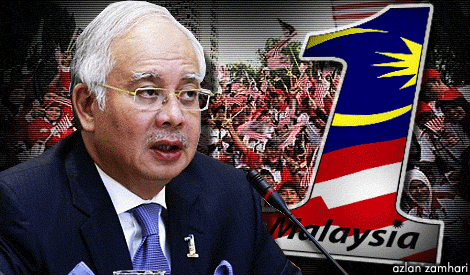
A research paper sponsored by CIMB Foundation said government programmes such as 1Malaysia, which is aimed at promoting integration, may have unintended consequences.
This is because the research, titled ‘Attitudes and ethnoreligious integration: Meeting the challenge and maximising the promise of multicultural Malaysia’, found that the concept of 1Malaysia carried different meanings for different races.
Conducted by Oxford university researchers Ananthi Al Ramiah, Miles Hewstone and Ralf Wolfer, the paper found that high level of national identification (identifying as Malaysian) was more effective in promoting positive attitudes towards other races amongst non-Malays compared to Malays.
“This suggests that the Malays may have a different conception from non-Malays of what it means to be Malaysian, a conception which does not relate to being more favourably disposed towards non-Malays,” said the researchers.
The research also found that non-Malays who have more friends from other races tend to have both stronger national and ethnic identification, but this is only true for Malays when it comes to making friends of the same race.
“Thus, we need to think carefully about how different audiences (i.e. different
ethnic/religious groups) receive the message of government integration efforts such as 1Malaysia, which seek, on the face of it at least, to promote national identification.
ethnic/religious groups) receive the message of government integration efforts such as 1Malaysia, which seek, on the face of it at least, to promote national identification.
“If national identification is associated with higher levels of outgroup friendships and more favourable outgroup attitudes only for the non-Malays, while having no such association for the Malays, then it may not prove uniformly beneficial in promoting integration across all ethnic groups.
“Further, the fact that ingroup friendships were associated with increased levels of both national and ethnic identification for the Malays suggests that Malays might be projecting their ingroup ethnic identity onto the national identity, thus possibly conceiving of being Malaysian as being ‘the same thing’ as being Malay,” said the paper.
Therefore, the researchers said speaking in terms of being a Malaysian to a Malay audience may not promote integration and could potentially hinder it.
‘Can have negative consequences’
“This asymmetry between Malays and non-Malays can have negative consequences over time because if the Malays associate ‘Malaysian-ness’ with being Malay, then non-Malays may begin to see urgings for Malaysian-ness as an attempt by the majority-led government to disregard important components that non-Malays contribute to the national identity and, in effect, to require of them assimilation, rather than involving everyone in integration.
“The question of what constitutes the ‘right’ or ‘true’ national identity is a very complex and fraught one, with which governments and people across the world must grapple. However, Malaysia is utterly lacking a meaningful conversation around this topic.
“In the absence of that, Malaysians are in the position of having an ill-defined Malaysian-ness thrust upon them, which can, over time, serve to weaken rather than strengthen national integration,” they said.
The paper, in its recommendation, urged the government to carefully rethink the policy.
“Programmes like 1Malaysia which are a central plank in the government’s efforts to promote integration may have unintended consequences, and need to be evaluated carefully,” it said.
However, the paper noted more research is necessary to replicate and further investigate the issue.
The research sought to study the inter-cultural and religious fault lines and how to overcome them.
CIMB Group chairperson Nazir Abdul Razak, together with two of the researchers, highlighted the research in an opinion piece on The Star last month.
They said the findings strengthen the case for strategies and initiatives to foster greater interaction between communities.- Mkini



No comments:
Post a Comment
Note: Only a member of this blog may post a comment.